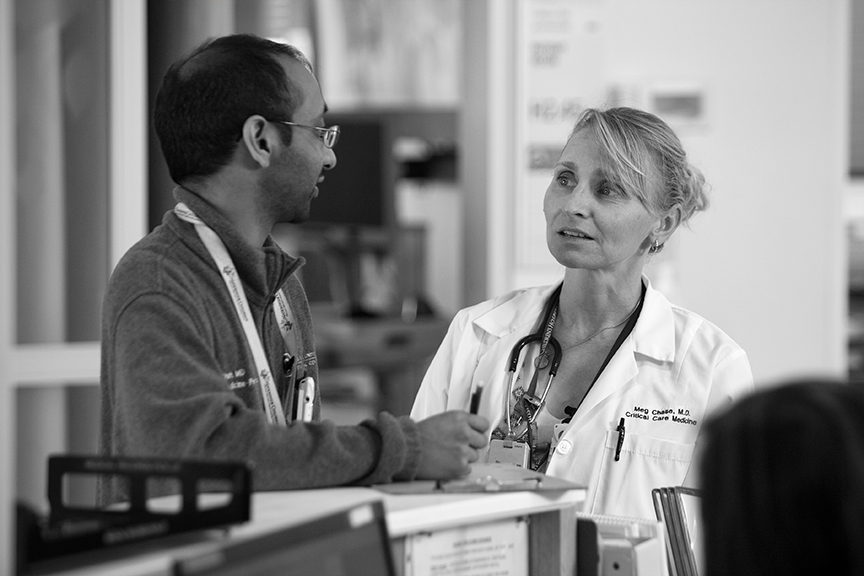Resident Education

Hands-On Experience
The diversity and volume of our patient population gives you hands-on experience at every level and each rotation. Residents provide the front line of patient care under the watchful and respectful supervision of the faculty. Residents write greater than 90 percent of inpatient orders at Nationwide Children's, and are relied on for their leadership, commitment and solid professional judgment. Children’s administration and Board of Trustees recognize that residents are integral to all aspects of patient care. You are involved in decision making at all levels and have ongoing, direct access to medical staff leadership, including the Chief Executive Officer.
Inpatient Teams Organized by Specialty
For decades, the Nationwide Children's Hospital pediatric residency program has organized the inpatient teams, floors and rotations based on the specialty of the patients' illnesses. Our inpatient ward teams are divided into Hospital Pediatrics (General Peds), Infectious Disease, Pulmonary, Renal/Endocrinology, Gastroenterology, Hematology/Oncology, Cardiology and Complex Care/Neurology. The advantages of having rotations focused on a specific specialty are many and include:
- The residents have the ability to immerse themselves into learning about a certain Pediatric specialty and focus rounds, inpatient and outpatient care, small group teaching and reading on that specific specialty during the rotation.
- Limits the number of faculty that residents need to consult to provide patient care. On many wards, a single attending is the only attending physician for all the patients on that team, which makes rounds, teaching and patient care family centered, efficient and focused.
- Exposes the residents to many different pediatric careers and sub-specialties early in their residency so they begin the process of deciding on their own specific career path.
- Build an effective patient care team. Since the care is specialty-based, nurses, respiratory therapists, case managers and other health care team members are all specialists in care of patients with related kinds of illnesses, which optimizes care for those patients.
- Nationwide Children's Hospital is a community hospital and the only hospital that admits children in the metropolitan area of almost two million people. Therefore, many of the patients admitted have common community illnesses such as bronchiolitis, dehydration, asthma, seizures, and infections.
- Even though many in-patient teams are specialty based, residents who are interested in primary care will be exposed to the common problems in those sub-specialties and can develop a deeper understanding of the management issues for patients with sub-specialty illnesses and learn more from the experts in their field.
Resident Assistants
Resident Assistants are an integral part of some of our busiest inpatient services here at Nationwide Children's Hospital. They assume responsibility for a wide variety of non-clinical duties allowing residents to devote more time each day to education, teaching and patient care.
Our Resident Assistants round with the team each morning which helps ensure smooth and efficient information gathering, scheduling and discharge planning for our patients. They work with families to make sure they have all the follow up appointments and paperwork they need before they go home. Resident Assistants support the team each weekday by handling administrative tasks such as obtaining prior authorizations, lab results, making appointments and coordinating follow up care. They are an amazing and greatly valued resource to our residents.
More detailed information highlighting the benefits Resident Assistants add to residency training can be reviewed in this recent JGME publication.
Workshops
Workshops and retreats are held for resident classes during specific times of residency training to focus that group of residents on topics that are pertinent to their education at that time, and to allow the residents to connect as a class. Current retreats/workshops include:
- Orientation — Orientation helps first-year residents transition smoothly from medical school to the hands-on training of residency. Residents learn about the hospital system and what is expected of a first-year resident. Residents participate in team-building activities and a skills assessment session during orientation along with completing certification courses in PALS and NRP.
- PL-1 Retreat — In late winter, a two-day overnight retreat is held off-site for first-year residents. This retreat focuses on stress reduction, team building and covers a variety of topics including personality types, teaching skills, communication skills and professionalism.
- PL-1 Supervisory Workshop — In late spring, a two-day workshop for first-year residents focuses on the upcoming challenges of being a supervisory resident, teacher and team leader. Residents also receive a ‘QI Education Overview’ to help prepare them to select their QI Project during their second year to select their QI project during their second year.
- PL-2 Workshop — In the winter, a one-day workshop incorporating teaching techniques and a variety of specialized programs to enhance your training.
- PL-3 Workshop — In the fall, a one-day workshop for third-year residents focuses on information needed to transition into medical careers after residency. Discussions include information about licensure and credentialing, CME, billing and coding, and managed care.
Two-Way Resident Communication
How does the residency program learn about resident interests, needs and concerns?
-
House Staff Advisory Committee (HSAC) – An advisory board to the program director, this committee is composed of residents from each class, elected each year by their peers. The HSAC represents the overall views of the residents and discusses issues that affect them in monthly meetings.
-
House Staff Business Meeting – On scheduled days, residents gather for a one-hour business meeting chaired by the chief residents. This informal meeting is used to pass along a variety of information, including upcoming events, guest speakers, curriculum changes, job opportunities and social events.
-
Program Director Forum – A monthly open forum with our program director team so we can discuss important issues and hear about your concerns.
-
Fellow and Resident Advisory Council (FRAC) – Serves a crucial role in communication among residents, fellows, and institutional leaders. FRAC collaborates with leaders throughout Nationwide Children's Hospital to enhance patient care, education, research, and advocacy.
Lectures
Nationwide Children's Hospital has a wide variety of lectures and training opportunities for our residents. View the Lecture Series Listings.
MyResidency App
Our program has developed an innovative MyResidency App designed to provide quick access to important clinical and program information. The app provides access to information about rotations, daily lectures, clinical guidelines, hospital phone numbers and the residency handbook.
Evaluating Your Progress
Evaluations are essential feedback during your residency. Your performance is evaluated monthly by attending physicians, primary care and emergency department faculty, elective preceptors, medical students and peers. Twice a year, you will meet one-on-one with a program director to review your progress. During this time, your program director will assist you with your decision regarding your rotation selection for the upcoming academic year, as well as discuss and support your future career plans.


